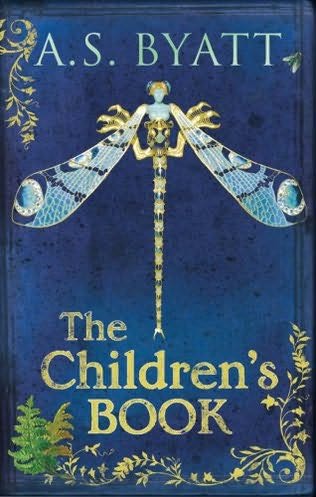 A. S. Byatt's The Children's Book is one of those reading experiences where the last 25 pages makes a huge difference. You can read here my reaction yesterday as I neared the end. It is in the final pages that Byatt gives the book its compass.
A. S. Byatt's The Children's Book is one of those reading experiences where the last 25 pages makes a huge difference. You can read here my reaction yesterday as I neared the end. It is in the final pages that Byatt gives the book its compass.All through the book, Byatt decorates the domestic dramas affecting the many characters with details about the historical/political landscape. Victoria dies and Edward ascends the throne, Kaiser Wilhelm vies for position, Fabians meet in England, anarchists riot in Germany. Byatt continually reminds us of the context but she keeps it light and distant, like a voice-over. She focuses especially on the revolution struggling to redefine the role of women and the working classes in European society. But as I read, I was always aware of World War I looming on the horizon, and every one of these events and the characters is subsumed by the horror of the war. The final chapters seem to start as a coda, but they are really the center of this novel. The social changes fought for as well as the worst tribulations of the characters become child's play next to the behemoth of the War.
Olive Wellwood, one of the novel's characters, is a writer of children's stories. She is a contemporary of J. M. Barrie, creator of Peter Pan. This work and Olive's own becomes the central metaphor for England, which Byatt's novel characterizes as a child that won't grow up, that prefers to live in a fantasy. Byatt pairs social and political forces with artistic ones to examine the consequences of living in fantasy:
...human beings had constructed a social structure no longer directly subject to evolutionary pressures and checks. Man was a creature who made beliefs and myths about the world, and morals, and treated them as things, not as words and thoughts.
Byatt's book tells the story of the convergence of the strongest forces of human creativity to push human beings off their course, in the end almost inevitably. People fashion ideas that compell them through narrative - history, colonies, border lines if they are empire builders, traditions if they are members of a society. These are high accomplishment to be sure, but they are narratives, fantasies - they are not the messy reality of life and they cannot be put in the place of life without consequences. This book asks us to consider the roles played by men and women, business and art, upper and working class, revolutionaries, creators of art, and its consumers, when those consequences are destruction, both in 1914 and now. The vastness of this narrative is finally given its center and although 575 pages is a long time to wait, there is nothing about the preceding pages that isn't worth reading, I just found the elements lacked synthesis until very late in the game. Perhaps that is because the glue that held them together resided initially in fact or concept rather than feeling. Byatt knew the war was to be a part of the narrative, I didn't. When this novel rallies, it is because of the emotion generated by the devastation of an entire way of life. It almost makes me want to go back and read the book again, but I will save that experience for a later date. Here are my previous thoughts about The Children's Book 1, 2, 3.
















3 comments:
I love Possession, one of my favorites of all time, but have not been able to become as involved in Byatt's other books. It sound's like this one may be right for me. It's good to know that it does all come together in the end.
I've admired some of her others, The Game, was creepy-good. This one is worth the sticking out.
Don't know if you aware that A S Byatt was interviewed on this blog on Monday and gave some insight to "The Children's Book". Here is the link in case you are interested to read it: http://dovegreyreader.typepad.com/dovegreyreader_scribbles/2009/07/dovegreyreader-asksasbyatt.html
I am looking forward to spend some quality time with this complex book. Don't you just love the cover?
Post a Comment